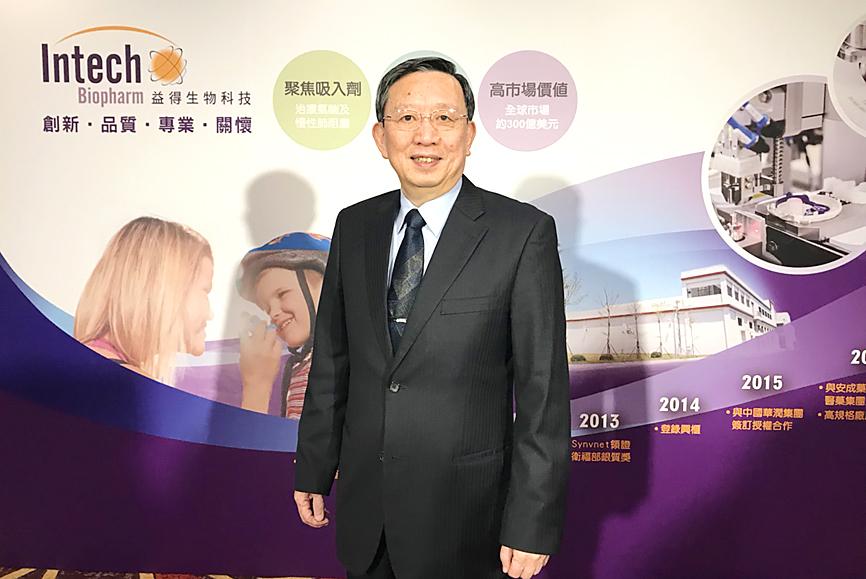Intech Biopharm Corp (益得生技) has started testing the effects of a metered-dose inhaler generic of Teva Pharmaceutical Industries Ltd’s ProAir, and expects to gain marketing approval by 2023, it said yesterday.
The company, which developed SYN011 to treat acute asthma, received approval from the US Food and Drug Administration in August to study the biochemical and physiological effects of the drug in a phase 3 clinical trial, Intech spokesperson Hugues Hung (洪堯國) told the Taipei Times.
The company has recruited about 200 participants with asthma for the test, dividing them into control and experiment groups to receive a placebo, a brand name drug and SYN011, to determine whether SYN001’s efficacy is comparable to that of a brand name drug, Hung said.

Photo: CNA
“We have to give participants some food containing allergens that can trigger asthma symptoms. We will see how the inhaler relieves the symptoms,” Hung said.
The study is to finish by the end of next year, and Intech plans to apply to the US agency for marketing approval in the first quarter of 2023, he said.
Intech is optimistic about the metered-dose inhalers market in the US, where the health regulator has become more open to generics amid the COVID-19 pandemic, he said.
Prior to the pandemic, the agency never approved generic versions of metered-dose inhalers, although some applicants had completed trials, Hung said.
As the pressurized metered-dose inhalers could be used to help relieve respiratory symptoms of people with COVID-19, the US regulator last year became more open, granting approvals to India-based Cipla Ltd and Lupin Ltd, which offer generic versions of Merck Sharp & Dohme Ltd’s (MSD) Proventil and Teva’s ProAir respectively, he said.
Last year, Cipla sold about 3 million inhalers and Lupin sold 1 million at lower prices than those of brand names, or at a discount of between 50 and 60 percent, Hung said.
Sales of MSD’s and Teva’s drugs were not affected by the generic versions, and they even raised their prices, suggesting there is a growing demand for the drug in the market, he said.
Intech expects to be the latest supplier of metered-dose inhalers using salbutamol as the main ingredient, which is used to relieve symptoms of asthma, after GlaxoSmithKline PLC, MSD, Teva and the two Indian firms, Hung said.
“With this market position, we will likely gain a market share of 10 to 20 percent,” he said.
More than 64 million metered-dose inhalers using salbutamol were sold in the US last year, Hung said, adding that a larger market share would help boost Intech’s revenue.

Vincent Wei led fellow Singaporean farmers around an empty Malaysian plot, laying out plans for a greenhouse and rows of leafy vegetables. What he pitched was not just space for crops, but a lifeline for growers struggling to make ends meet in a city-state with high prices and little vacant land. The future agriculture hub is part of a joint special economic zone launched last year by the two neighbors, expected to cost US$123 million and produce 10,000 tonnes of fresh produce annually. It is attracting Singaporean farmers with promises of cheaper land, labor and energy just over the border.

US actor Matthew McConaughey has filed recordings of his image and voice with US patent authorities to protect them from unauthorized usage by artificial intelligence (AI) platforms, a representative said earlier this week. Several video clips and audio recordings were registered by the commercial arm of the Just Keep Livin’ Foundation, a non-profit created by the Oscar-winning actor and his wife, Camila, according to the US Patent and Trademark Office database. Many artists are increasingly concerned about the uncontrolled use of their image via generative AI since the rollout of ChatGPT and other AI-powered tools. Several US states have adopted

KEEPING UP: The acquisition of a cleanroom in Taiwan would enable Micron to increase production in a market where demand continues to outpace supply, a Micron official said Micron Technology Inc has signed a letter of intent to buy a fabrication site in Taiwan from Powerchip Semiconductor Manufacturing Corp (力積電) for US$1.8 billion to expand its production of memory chips. Micron would take control of the P5 site in Miaoli County’s Tongluo Township (銅鑼) and plans to ramp up DRAM production in phases after the transaction closes in the second quarter, the company said in a statement on Saturday. The acquisition includes an existing 12 inch fab cleanroom of 27,871m2 and would further position Micron to address growing global demand for memory solutions, the company said. Micron expects the transaction to

A proposed billionaires’ tax in California has ignited a political uproar in Silicon Valley, with tech titans threatening to leave the state while California Governor Gavin Newsom of the Democratic Party maneuvers to defeat a levy that he fears would lead to an exodus of wealth. A technology mecca, California has more billionaires than any other US state — a few hundred, by some estimates. About half its personal income tax revenue, a financial backbone in the nearly US$350 billion budget, comes from the top 1 percent of earners. A large healthcare union is attempting to place a proposal before